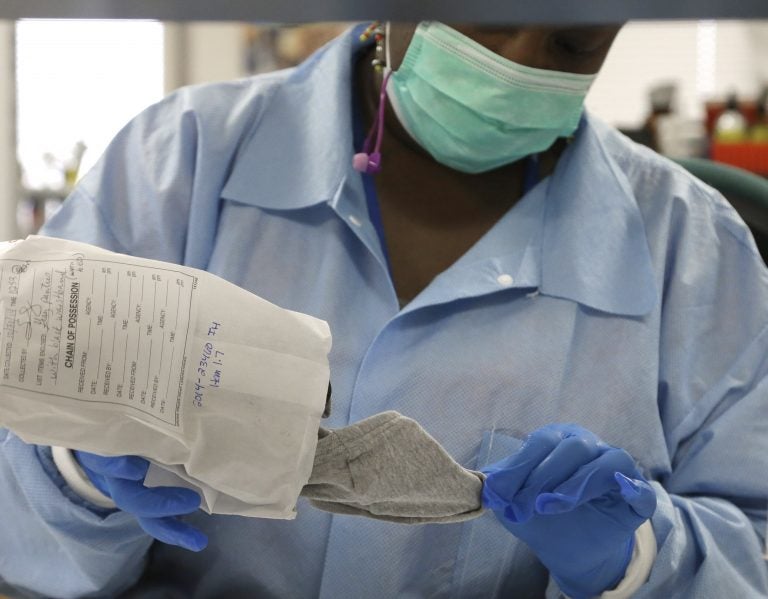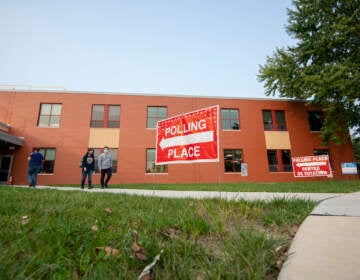Finding justice for rape victims whose cases went unresolved
Delaware is working through a backlog of untested rape kits, some decades old. Advocates say it assures victims they’ll be believed if they come forward.
Listen 2:07
In this April 2, 2015, file photo, a forensic analyst removes a pair of underwear from an evidence bag for testing in a sexual assault case in the biology lab at the Houston Forensic Science Center in Houston, Texas. (Pat Sullivan/AP Photo, File)
Delaware was part of a national backlog of untested rape kits just four years ago.
Today, the state is about a month away from resolving the backlog, and will continue to investigate rape cases that have gone unresolved for months or years.
Advocates say the process is giving victims the justice they deserve, and ensuring they will be believed if they choose to come forward.
“They’ve gone through this traumatic experience, and a secondary trauma of having to go through these tests, and it’s almost like an answer and a conclusion to the journey and the story,” said Mary Skaats, who co-chairs the Sexual Assault Network of Delaware.
“I don’t believe [a conviction] makes it all go away,” Skaats said, “but I do believe it provides a part of healing, a sense of closure. ‘This happened, I was tested, and now this person will now answer for their crime.’”
Several days ago, Hayim Raison, 38, of Chester, Pennsylvania, pleaded guilty to raping seven women in Wilmington between 2014 and 2018.
Raison’s plea came as a result of a federal effort called SAKI, for Sexual Assault Kit Initiative, that aims to fund testing of more than 200,000 rape kits nationwide. As of spring 2019, more than 47,000 of those kits had been tested.
‘It seems like justice being denied’
Across the country, backlogs were caused by poor evidence tracking, outdated investigation practices, a lack of resources, and a lack of awareness in law enforcement, according to SAKI. Plus, DNA testing of evidence did not exist in the 1970s and ’80s.
“I think it was more disheartening,” said Skaats, whose organization partners with SAKI in Delaware. “It takes so much bravery for survivors of sexual violence to come forward and say, ‘This happened to me,’ and to know you went through all of that and then there’s this backlog, it seems like, ‘It’s not being taken seriously, and I’m not going to get justice.’
“It’s part of healing, going through that process,” she said, “and to have that backlog, it seems like justice being denied.”
In 2015, Delaware received $1.2 million from the Department of Justice-led initiative. Raison’s recent guilty plea was the second conviction in the state to result from the testing of 821 rape kits, some backlogged from as far back as the 1980s.
Delaware is not the only place seeing results. New Orleans law enforcement was able to link the sexual assaults of eight women in two states to one man. In North Carolina, a rape suspect was charged with two additional sexual assaults dating back to 1985.
Last year, Delaware received another grant to test an additional 316 kits untested between 2015 and 2018. When the results of those return by late October, the backlog will be resolved.
Sexual-assault victims may ask hospitals to perform rape tests to collect DNA evidence in the event they choose to report the crimes. Doctors also can use rape kits to determine any physical injuries and to test for HIV and sexually transmitted infections.
Testing kits through the SAKI effort allows law enforcement to open or reopen investigations, which could lead to prosecution. Victims are given the opportunity to prosecute or not — and can change their minds at any point of the process.
“It’s victim-driven, and working at the victims’ pace is the key because we don’t want to cause any more damage or injury to the victims,” said Michael Kelly, who coordinates the initiative in Delaware.
If a victim chooses not to move forward, counseling is still available through the initiative.
“I measure that as a success, that we’re providing services for someone who may not be ready to come forward for prosecution, they may need someone to talk to, they may need support,” Kelly said. “Ultimately, taking that offender off the street, holding him accountable for his action, that’s another way of measuring success.”
Taking a victim-first approach
Numerous cases are at various stages of investigation and may be prosecuted, Kelly said. He’s hopeful there will be more arrests.
The initiative, which created a special unit devoted to the matter, works to assure recent victims who come forward that their cases will be handled with respect, and that improved protocols and communication between hospitals, law enforcement, and the criminal-justice system are in place.
Elizabeth McCourt said her organization, the Sexual Assault Response Center, partnered with SAKI because of its victim-first approach.
The center saw more than 1,300 victims and their loved ones last year, and about 35% of the organization’s clients are either taking their cases to law enforcement or prosecuting them.
McCourt said she was not aware whether a client had ever expressed concern about an untested rape kit, but she added that several want to revisit a previous decision not to report, or a previous decision to not get a rape test kit.
Victims don’t report sexual assault for many reasons, such as the fear of not being believed, how they’re treated by law enforcement, or because the experience of going through the process is too emotionally traumatic.
“Most survivors either step out [of the prosecution process] at some point and the focus is on how this has changed their lives, how this has changed their ability to have relationships, to feel safe and recover and move on, rather than going through the process of what the rest of us might look at as justice in the criminal-justice system,” McCourt said.
“It can be difficult for us as advocates to stand by when so many survivors choose not to be involved in the criminal-justice system or law enforcement,” she said. “It inspires us to be the best we can in cooperating and providing information on how they can be supported throughout that process.”
She said holding serial rapists accountable thanks to SAKI ensures victims will be believed.
“The biggest barrier to most survivors coming forward is that they do not feel supported or believed. Even if it’s an old case, it sends a really important message to every other survivor that’s out there,” McCourt said.
She added that while a guilty plea or conviction can provide some closure, it doesn’t erase what happened to the victim, and there’s still more healing that needs to continue.
“It doesn’t provide closure for how these individuals were treated. For most survivors, they have closure that needs to come on a number of different levels,” McCourt said.
“We know that if there were seven victims, there were probably more, and for these seven victims what was their experience like that got them to this point? We’re focused on this guy’s going to jail, which is great for the community, but it’s not so great for the individual survivors necessarily.”
—
Anyone who has had a sexual assault kit collected and would like more information can contact the Delaware Victims Center at 1-800-VICTIM1 (1-800-842-8461) or the Delaware Criminal Justice Council, SAKI coordinator, at 302-577-8717 or cjc.delaware.gov.
All victims of sexual assault can receive support and information by calling the following Rape Crisis Hotlines 24/7: New Castle County and Sussex County – YWCA SARC at 1-800-773-8570, Kent and Sussex County – Lifeline Rape Crisis at 1-800-262-9800.
WHYY is your source for fact-based, in-depth journalism and information. As a nonprofit organization, we rely on financial support from readers like you. Please give today.





